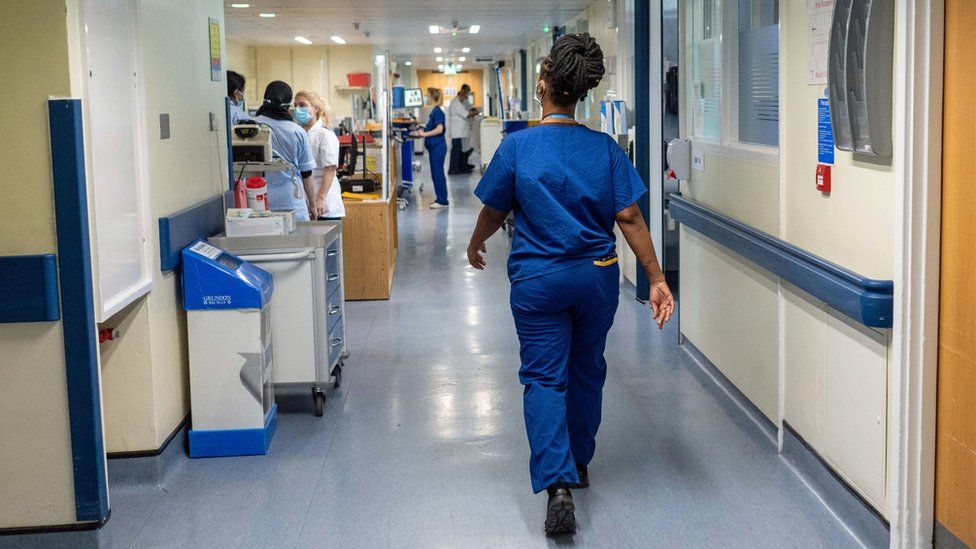
By Nick Triggle
Health correspondent
NHS consultants in England have voted in favour of strike action in their fight for more pay.
Some 86% of British Medical Association members backed walkouts over what the union described as repeated pay cuts.
The union had already announced that a 48-hour walkout on 20 and 21 July would take place if doctors backed action.
It will follow a five-day strike by junior doctors – the combination is likely to lead to huge disruption to services, and cancelled treatments.
The walkout by junior doctors across all services will end on 18 July.
Consultants will be providing what is being described as Christmas Day cover during their own strike – so emergency care will be provided, along with a very limited amount of routine work.
British Medical Association (BMA) consultants committee chair, Dr Vishal Sharma, said the vote showed how “furious” they were at being repeatedly devalued by the government.
“Consultants don’t want to have to take industrial action, but have been left with no option in the face of a government that continues to cut our pay year after year.”
But he said it was not too late to avert strike action, and urged the government to come forward with a credible offer.
Sir Julian Hartley, chief executive of NHS Providers, which represents NHS trusts, said the “double-whammy” of strikes by doctors next month was a “huge risk” for the NHS to manage.
No pay offer
Consultant pay has fallen by 27% since 2008 once RPI inflation is taken into account, but the BMA said once changes to tax and pension contributions were factored in, the cut to take-home pay was 35%.
A major factor in this is the fact that income tax thresholds have been frozen, and the introduction of the additional 45% tax rate for the highest earners.
During 2022, average NHS earnings exceeded £126,000 for consultants – this includes extra pay for additional hours and performance.
Unlike junior doctors at the start of their dispute, consultants are not asking for full pay restoration in one go. Instead, they want to see the government to start at least giving pay rises that match inflation.
Last year they received a 4.5% pay increase – less than half the rate of RPI inflation in the 12 months to March. No formal pay offer has been made for this year yet.
Junior doctors were offered a 5% rise this year in their talks with government. They rejected this, but have since said they would be willing to phase in pay restoration over a number of years.
Meanwhile, a ballot by the Royal College of Nursing failed to achieve a high enough turnout to give the union a mandate to continue its strike action.
That result – also announced on Tuesday – means the long-running dispute with nurses now comes to an end.
Labour shadow health secretary Wes Streeting said: “This is an unmitigated disaster of the government’s making and the risk to patients and the NHS is intolerable.
“Rishi Sunak cannot continue to sit back like a passive observer and let this go ahead. He must now get the doctors in for immediate negotiations to bring these strikes to an end.”
Are you a consultant with a view on the strike? Are you a patient affected? You can share your experiences by emailing haveyoursay@bbc.co.uk.
Please include a contact number if you are willing to speak to a BBC journalist. You can also get in touch in the following ways:
If you are reading this page and can’t see the form you will need to visit the mobile version of the BBC website to submit your question or comment or you can email us at HaveYourSay@bbc.co.uk. Please include your name, age and location with any submission.








